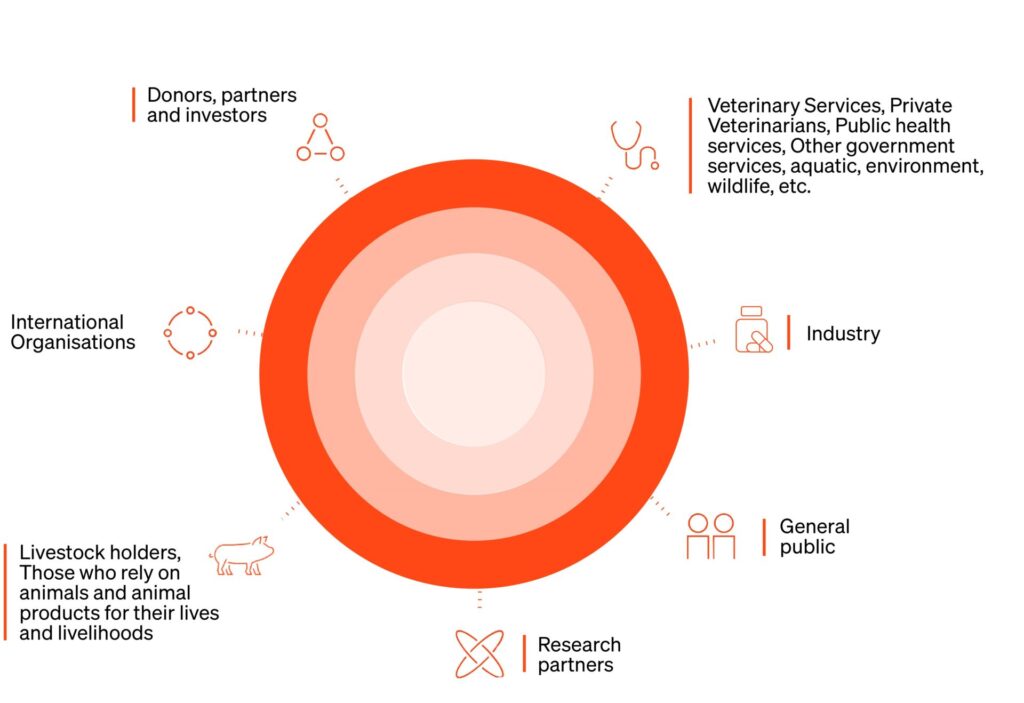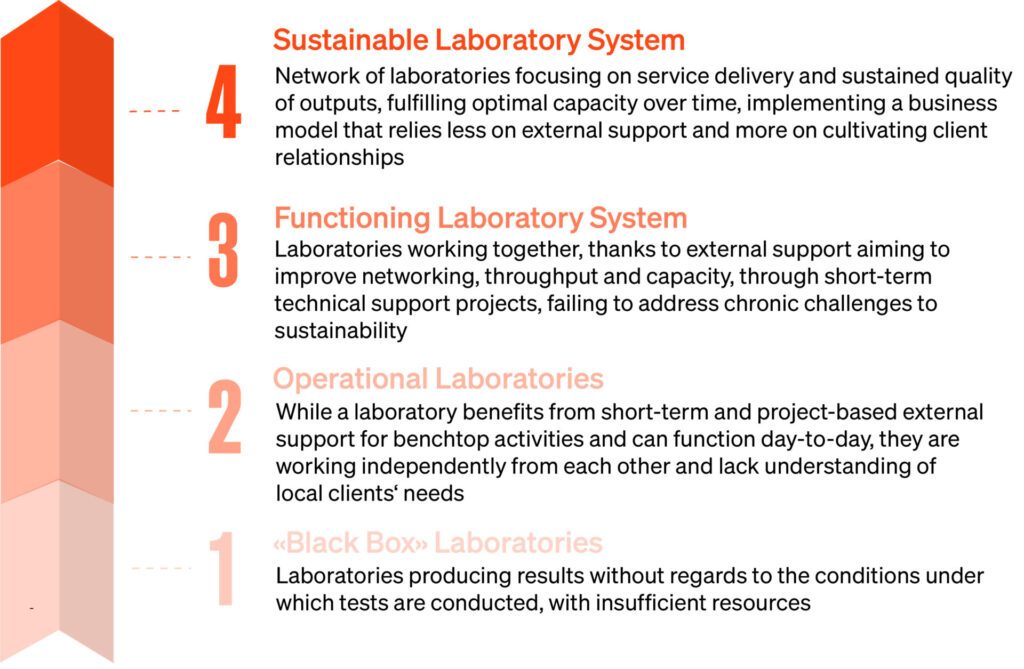Sustainable Laboratories
Over the course of history, disease diagnosis provided by health laboratories has emerged as a pillar of pandemic preparedness. Thanks to their experience in dealing with large-scale epidemics in animal populations, providing expertise on disease origin and evolution, as well as processing human samples, veterinary laboratories played a critical role during the COVID-19 outbreak. By contributing to disease surveillance, detection and control, laboratories support health systems and help reduce risks posed to animal, human, and environmental health.

Some veterinary laboratories worldwide struggle to meet critical requirements and sustain achievements over time. A lack of sustainability represents a threat to national, regional and global security given the functions that laboratories serve as biobanks for dangerous pathogens. In light of this challenge, it is important to promote innovative solutions, leverage investments, and consider new opportunities that can lead to more sustainable laboratory services while promoting biosafety and biosecurity.
What is a sustainable laboratory network?
A system of laboratories that together continuously deliver specialised services in a manner which:
- Is efficient, timely, accurate, consistent, secure, and safe,
- Is in line with international standards and best practices,
- Is provided at an acceptable cost,
- Responds to clients’ needs across sectors (public and/or private), and
- Benefits One Health goals and the overall One Health system.
This system is made up of specialised facilities where the combination of qualified staff, infrastructure, and scientific methods are used to convert financial, human, and material resources into durable outputs, such as reliable test results, health information for the public good, and valuable data.
Ad hoc Group on Sustainable Laboratories
Why do we need sustainable laboratories?
A functioning and appropriately resourced laboratory contributes to prosperity, stability and security at national, regional and global levels. A wide range of actors directly benefit from well-managed and sustainably resourced laboratories.

What are the benefits of sustainable laboratories?
Improved biosecurity
by containing pathogens and preventing unauthorised access to reduce the risk of release that might threaten neighbouring human, animal or environmental health
Improved biosafety
by preventing exposure to biological materials
Higher quality of services
by ensuring confidence in laboratory test results to help take sound decisions to prevent disease spread and supporting the provision of accurate and timely data that responds to client demand
Preparedness
by learning from past events and planning responses during “peacetime”
Ensured business continuity
by managing resources and expertise ahead of potential emergencies
What do laboratories need to achieve sustainability?
To achieve sustainability, social, environmental and economic factors must be taken into account in day-to-day operations. Laboratories need:
Good laboratory management practices
Sufficient resources to carry out functions
Samples flowing consistently into the laboratory system for efficient and effective service delivery
Good governance of the public sector
Where are we now?

To date, veterinary laboratory networks across the world – and especially those in low-resource settings – struggle to make it to the level of a functioning and sustainable laboratory system working towards implementing international Standards.
Yet, the need to put laboratories on a more sustainable path has never been greater, at a time when diseases affecting animals, humans and the environment call for effective ways to achieve global health security.
Interventions targeting sustainable laboratory networks are fundamentally different from laboratory-based projects targeting building technical capacity. They require different indicators to measure performance over time and ensure accountability of beneficiaries, implementers and investors. To develop interventions to maintain that technical capacity built over time and to create sustainable laboratory networks for the benefit of health systems, relevant data and indicators that measure the laboratory network’s performance against expected outcomes and impact are critical.
A growing need for evidence and data
To help them overcome sustainability challenges and provide high-quality test results, laboratory systems need performance data and indicators to inform their advocacy efforts for appropriate investments from internal and external, public and private sources. Shining a light on the importance of data is also reflected in the Observatory’s mission to better understand the implementation of international Standards. The Observatory is a monitoring framework carrying out systematic analyses of the implementation of the international Standards, designed to collect quality data upon which specific needs can be identified.
Evidence-based policies and decision-making have never been more urgent, especially in the wake of the COVID-19 pandemic. Future investments need to be carefully considered for long-term and strategic improvements and should focus on sustainable performance, quality, safety, security and competency to address the shortcomings of health systems brought to light by the pandemic.
However, many Members today do not have a comprehensive view of the inputs and investments needed, and costs associated with laboratory service delivery. As analyses of costs and benefits of the services delivered are not available, advocacy efforts are hampered. The most common issues are the lack of data and the inability to fully leverage the existing laboratories.
Mitigation of animal disease threats through sustainable laboratory biosafety and biosecurity: a WOAH initiative
Heavy investment in laboratory capacity building and improving performance in the short term has meant that the sustainability of those hard-earned gains in the long term has suffered. Traditionally, the most common approaches to laboratory capacity building have focused on technical and scientific strengthening like training, provision of consumables, and capital investments like new laboratory construction and equipment provision. They concurrently dismissed underlying strategic, management, and financial conditions, thus failing to address persistent challenges to sustainability. Given the lack of data and indicators, it is hard to understand which groups are in most need of support, and which areas require or lack investment.
WOAH envisions a world where laboratories ensure that Veterinary Services have access to quality diagnosis through a sustainable network of laboratories, capable of accurately identifying and reporting infections and other hazards. WOAH plays a critical role in the data-gathering process.
With the generous support of Global Affairs Canada, the World Organisation for Animal Health (WOAH) has launched the Sustainable Laboratories Initiative to assist Members to improve sustainable laboratory biosafety and biosecurity and to reduce the risk of accidental or intentional release of dangerous pathogens in Members. Through this project, the organisation will further develop its portfolio on laboratory sustainability with the objectives of promoting evidence-based laboratory biosafety and biosecurity, fostering strategic decision making for national laboratories’ resources, and promoting the sustainable implementation of its international Standards in the veterinary laboratory setting.
WOAH promotes the use of data to inform decision making and support advocacy efforts for investment in sustainable laboratory networks. Given the data collected about laboratory capacity and service delivery through the PVS Pathway and WAHIS, the Organisation has developed insight and dashboards to help Members and stakeholders better understand achievements to improve sustainability.
How can stakeholders drive change?
When it comes to laboratory sustainability, the main objective is to highlight areas where investment is needed to ensure long-term stability, consistency and security of health systems globally. With data, laboratory leaders and clients who rely on their services can advocate for a changed business model for improved service delivery, increased efficiency, and higher quality. They can better demonstrate to governments and donors their specific needs and the targeted areas for improvement to avoid waste. Other actions laboratories can take are:
- Developing concrete and evidence-based arguments for advocacy
- Creating position paper on investment needs for sustainable laboratories
- Carrying out cost-benefit, cost-
- Enhancing risk-based management of biological hazards and threats
- Calling for innovative and effective laboratory design and investments that are fit-for-purpose in low-resource settings, regardless of the sector.
What other factors can help achieve sustainability in laboratories?
Political buy-in, good governance, and empowerment of laboratory staff are key to the sustainability of a laboratory facility and network of which it is a part, but they are not enough: everything from infrastructure design to supply chains must be ‘fit for purpose’ and be adapted to both the local context and its risks.
Creative and open-minded thinking and innovation are key to improving laboratory sustainability. A sustainability strategy must also consider sustainable approaches to education, training, and retention of talent. Additionally, private-public-partnership models – which engage private sector users and suppliers – can also improve the business models of laboratories and strengthen their capacity-building efforts.
Leadership is another key pillar of the Sustainable Laboratories Programme. Strengthening biosafety and biosecurity requires strong laboratory leaders. This is why WOAH, in cooperation with multiple partners, aims to provide laboratory professionals with the necessary tools to develop their laboratory leadership competencies and advance effective national laboratory systems for improved health security using a One Health approach.
To improve the global capacity for disease prevention, detection and control through capacity building and networking, WOAH has been running the Laboratory Twinning Programme since 2006.
Funding: Global Affairs Canada
